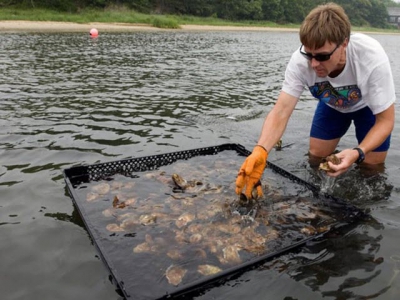Researchers to explore pre-permitting approach to aquaculture in New England

The labyrinthine process of obtaining the proper permits to establish fish farms in federal waters has been frequently cited as a major obstacle to the advancement of the U.S. aquaculture sector.
Photo courtesy of Tom Kleindinst/Woods Hole Oceanographic Institution
Currently, an application to start an aquaculture operation in federal waters is reviewed by a plethora of federal agencies including the Army Corps of Engineers, the U.S. Coast Guard, NOAA Fisheries, and the Environmental Protection Agency, along with a collection of state agencies if the proposed site is located near state waters. The long review process is often cited as being too complex and costly, according to Hauke Kite-Powell, a research specialist at the Marine Policy Center of the Woods Hole Oceanographic Institution.
“It’s expensive and time-consuming,” Kite-Powell told SeafoodSource. “We know that the aquaculture industry is growing quite rapidly internationally and that we are lagging behind in the U.S. – and we certainly aren’t doing ourselves any favors by standing in the way of sustainable aquaculture development in the U.S. exclusive economic zone.”
Kite-Powell, with funding from NOAA and in collaboration with researchers from University of Massachusetts Boston and the New England Aquarium, is part of a team looking to disrupt the current process and establish a federal system for pre-permitting federal waters for aquaculture, making the permitting process smoother, quicker, and less costly for anyone trying to establish a farming operation in federal waters.
“The idea is to simplify and reduce the cost of obtaining permits to farm marine species in these areas by carrying out fisheries, protected species, shipping industry, and other reviews on a large scale in advance, leaving the aquaculture venture with a significantly lower regulatory burden,” according to the project overview.
The approach has had some success in Maine, where a “limited-purpose aquaculture license” is available under simplified permitting rules to give growers a chance to test production plans before obtaining long-term leases. It has also been a topic of discussion among California industry leaders and regulators.
“With pre-permitting, all of the proper reviews would be completed at once in a designated area – a clearly defined range of gear- types and densities would be set for that area,” Kite-Powell said. “Then a business owner or municipality, if interested in that space, would just have to prove that their operation would fall under those guidelines.”
To test the approach, Kite-Powell will be working with municipalities throughout New England that are interested in aquaculture – shellfish and seaweed to start – and open to exploring a pre-permitting review process.
After speaking with shellfish growers and seaweed harvesters in the region, the team has identified New Bedford, Massachusetts, and Portsmouth, New Hampshire, as its first potential partners. The team is also in discussions with the government of Gloucester, Massachusetts, and a few other communities, for a potential second wave of partnerships.
Kite-Powell cited a recent surge in land-based aquaculture operations landing in Maine – including salmon farming projects run by Whole Oceans, Nordic Aquafarms, and Aquabanq, and the yellowtail farmer Kingfish Zeeland — as promising examples of municipality-aquaculture relationships.
“New England towns are looking for ways to ensure the future use and viability of their working waterfronts,” Kite-Powell said. “There’s a lot of pressure in these communities, as the local fishing industry shrinks, to turn over those working waterfront properties to developers. A lot of these communities feel like, once that happens, you can’t go back and that these towns will lose a lot of historic characters if the working waterfront disappears. I think aquaculture has become an answer to some of those concerns.”
The research project has been slow to start, but Kite-Powell is aiming to have at least two municipalities on board by early 2020 to commit to testing the process.
“It’s been slow-going at the start here, but we’re gaining traction and will soon be getting out on the water to identify areas to work in,” Kite-Powell said. “There’s a supportive environment for this work in New England and at NOAA.”
Related news
 State agencies try to rescue seafood exports to China
State agencies try to rescue seafood exports to China Vietnamese export companies are seeing their seafood products stuck on the way to China at Mong Cai border gate in Quang Ninh province.
 Vietnam to tighten the control of exceeding Chlorate level in pangasius
Vietnam to tighten the control of exceeding Chlorate level in pangasius NAFIQAD has just issued the official document no.1988/QLCL-CL1 about the EU’s warning about Chlorate level in the Vietnamese pangasius.
 Vietnam targets 65 percent growth in marine aquaculture industry
Vietnam targets 65 percent growth in marine aquaculture industry Vietnamese officials have announced plans to substantially increase the size of its marine aquaculture sector.